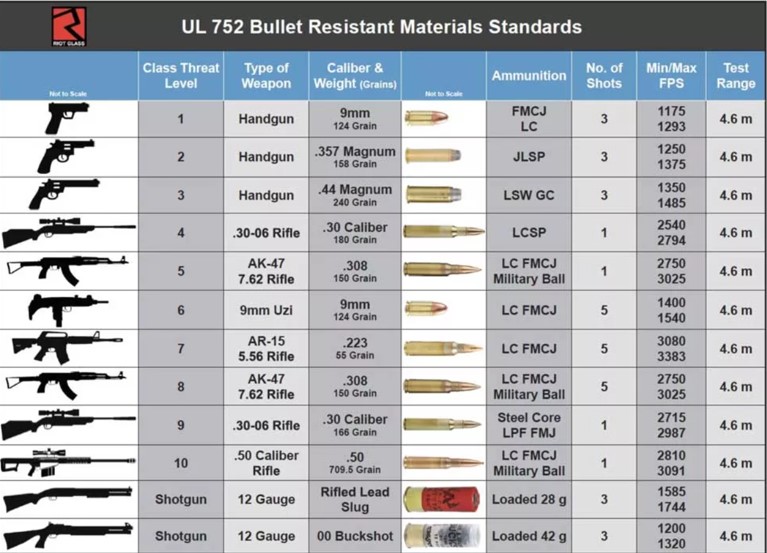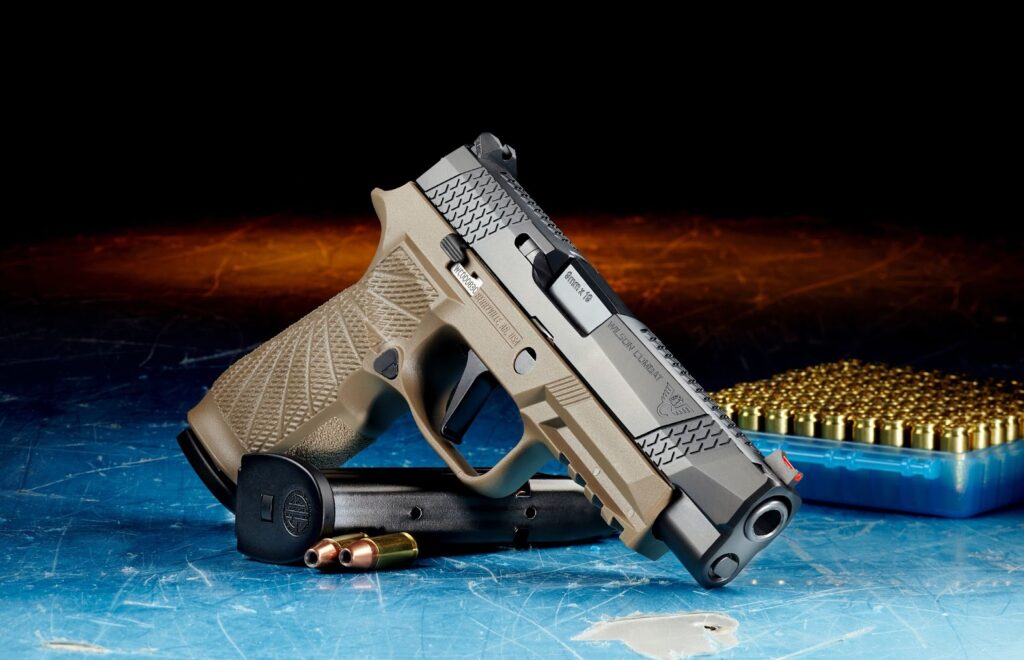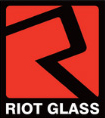Written By: Brad Campbell | February 16, 2023
In the security industry, bullet-resistant products are rated using bulletproof levels established by the Underwriters Laboratories (UL), an international safety and security certification company.
Riot Glass LLC’s ballistic-grade security glazings are all rated according to the UL 752 scale of ballistic resistance levels.
If you’re considering upgrading your building’s security using bullet-resistant glazing, it’s important for you to understand exactly how this rating scale works and what the different UL 752 levels mean.
The UL 752 Standard is used to showcase how bullet resistant certain building components are, including windows, barriers, walls, and other components. The Standard itself has been created by the Underwriters Laboratories that we’ll talk about a bit later in the article.
As for how the Standard is created - it basically takes into account the components’ material and ability to either stop bullet penetration or delay it. The weapon and bullet types are also crucial factors that the UL 752 Standard uses.
While there are other rating systems out there for certifying ballistic-grade materials, the UL 752 rating system is the most widely used and accepted.
There are 10 different UL 752 levels, each of which indicates important information about what types of rounds and firearms a material can resist.
For example, a piece of security glass with a UL 752 Level 1 rating can withstand at least 3 shots from a 9mm handgun using 124-grain rounds. Check out the rating chart below for a look at all the different UL 752 levels.

No security product, no matter what anyone says, is 100% bulletproof. The correct way to describe products that can stop one or more of a certain type of round fired by a specific type of firearm is bullet resistant.
Products rated with UL 752 levels are bulletproof only up to a point. We already mentioned that a piece of security glazing with a UL 752 Level 1 rating can stop 3 or more rounds from a 9mm handgun, but that same product would not stop a single .50-caliber rifle round.
Even materials with very high levels of bullet resistance will eventually be penetrated by repeated fire or by a more powerful firearm.

Now that you understand more about how bullet resistance ratings work, you might be wondering something like: “why bother using ballistic-grade glazing if it can still get penetrated by bullets?”
Well, the answer to that is the following two words: access denial.
When a building, such as a school or an office building, is under attack by an active threat, ballistic-grade security glazing goes a long way toward keeping the bad guys out of the facility or out of certain areas inside the building.
A property’s security is only as strong as its windows and doors, and during an active threat scenario, an attacker can shoot out a window or door to easily gain access to the building, potentially causing a tragic amount of harm to those inside.
Bullet-resistant glazing buys valuable time during the first few seconds of a ballistic attack. Depending on the specific UL 752 level of the door or window glazing, it can stop several rounds from guns commonly used by active threats, including various handguns and AK-47 or AR-15 assault rifles.
This protects those on the other side of the security glazing and gives them time to react by running, hiding, and barricading themselves inside somewhere safe until the police or FBI arrive and neutralize the threat.
Even if an active threat penetrates a piece of security glass or polycarbonate glazing with multiple rounds, they won’t be able to pass their hand through to open a door from the inside or climb through a window and do people harm.
Underwriters Laboratories is a non-profit organization dedicated to conducting independent research and developing global safety standards to improve living and working throughout the world.

The organization focuses on applied safety science research as well as develops and maintains consensus-based safety standards for both new and existing products and technologies, including safety and security glass.
One of the ways the Underwriters Laboratories maintains these safety standards is by providing testing and certification services for materials and products. For all bullet-resistant security products on the market, the rating scale used is the UL 752 ballistic resistance level system.
Our Riot Glass® laminated security glass and ArmorPlast® polycarbonate security glazing are available with UL 752 ratings up to Level 7.
A sheet of glazing with a UL 752 rating is able to withstand 5 shots from an AK-47 rifle firing 150-grain, military-style rounds.
The level of bullet resistance you need for your windows and doors largely depends on the threat level your building faces.
For many commercial properties with an average threat level of an active threat scenario, products with UL 752 Level 1, 2, or 3 ratings may provide adequate protection. For very high-security facilities, where threat levels may also be higher, you may want glazing with a higher level of ballistic resistance.
The best way to determine the right bullet-resistant glazing for your unique security needs and goals is by getting a professional threat assessment done for your property.
During a threat assessment, a security professional looks at all your building’s existing security measures, identifies weaknesses, and makes recommendations for how to improve security based on the perceived and actual threat levels you and your property face.
If you don’t think ballistic-grade protection is necessary for your facility, but you still want to protect against forced entry, burglary, and other threats, we also offer containment-grade (non-ballistic) security glazing.
Contact us today for more information about our bullet-resistant and forced entry-resistant glazing products or to schedule a free consultation.

HOW CAN WE HELP YOU?
